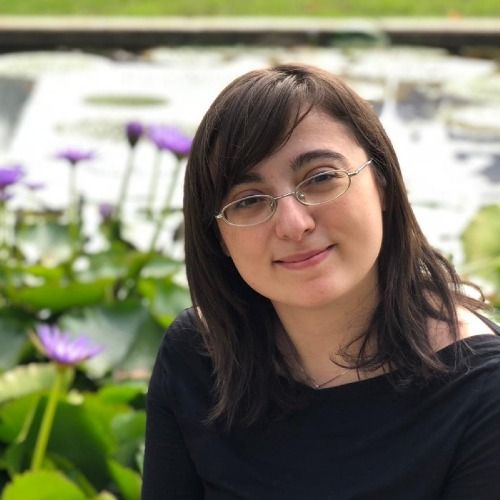Episode 7
Principled Hiring with Patricia Andrade
In this episode, Patricia Andrade, recruiter and co-founder of Principled, joins Serena for an honest conversation about living and working in alignment with your values and working during the Genocide in Palestine. Patricia shares her journey of building a recruitment agency that connects principled candidates with companies that stand on the right side of humanity, especially in times of global crisis.
Together, they discuss the importance of finding your tribe, supporting one another, and making courageous choices, even when it means walking away from comfort for the sake of integrity. Patricia offers practical advice for job seekers looking to align their careers with their beliefs, and reflects on the legacy we leave for future generations.
Tune in for an inspiring discussion on Palestine, authenticity, community, and the power of standing up for what matters most.
- Patricia's Linkedin
- Principled website
Transcript
And I think showing your values as a human, I think it's very important
Patricia:to raise your family in the right way.
Patricia:And that's not something that many people agree with us, and
Patricia:I feel sorry for these people.
Patricia:I wanna be able to tell my daughter in the future that this is what mom stand
Patricia:in the past and what she keeps doing.
Serena:Welcome today, I am really happy to have a conversation with Patricia.
Serena:Recruiter and co-founder of Principal, a recruitment agency for people with
Serena:values who are looking for a job.
Serena:Welcome, Patricia.
Serena:What does it mean?
Serena:I'm back for you.
Patricia:Something more practical for people.
Patricia:For example, it's my first advice will be to seek support to your tribe.
Patricia:Choose your tribe wisely.
Patricia:Choose the people you wanna be surrounded with and people who will be understanding,
Patricia:supportive of these conversations.
Patricia:You know, take for Palestine, for example, was, and it is a great support for
Patricia:myself because, you know, we all from everybody in the world and it's a safe.
Patricia:Space to talk about the action that we taking, to talk about the news that we
Patricia:are receiving, and even to take part in amazing projects to help Palestinians
Patricia:currently based in Russia in the West Bank and diaspora all around the world.
Patricia:So I think that's the important part.
Patricia:Second of all, I will say it's really important to come back to yourself
Patricia:even after having a long day at work, taking part in these projects.
Patricia:It might be easy to feel that guilt, and trust me is, I mean, you know, if
Patricia:it was myself being in the scheme of the people that I talk to, obviously
Patricia:I will reconsider things, but this prime, there are examples and examples.
Patricia:I have been listening to people's stories, for example, that they decided to walk
Patricia:away from their jobs knowing that the financial impacts with the lifestyles and
Patricia:basic needs will be at odds with that.
Patricia:But they chosen to, to be driven by their values and what's best for their
Patricia:hearts and their soul, which I admired.
Patricia:I highly admired.
Patricia:And I equally highly admire the people who are conscious about what they're doing,
Patricia:and they want to step away from that.
Patricia:They come to us, they come to principal, and they ask as
Patricia:well, I'm ready to walk away.
Patricia:But you know, obviously I'm being mindful of how, what steps I'm
Patricia:taking in order to do that because I have a family, I have a mortgage.
Patricia:I have dependence under my care.
Patricia:And obviously financing these basic needs is important.
Patricia:So as soon as there is an opportunity ready, please put me forward
Patricia:because that will be my next step.
Patricia:So I equally admire these people, and in the meantime, I keep telling
Patricia:the same, you know, make sure you find your tribe, even if it's us.
Patricia:Maybe if you're not acquainted with any tribes with
Patricia:pro-Palestinian views in activism.
Patricia:Principle is still for you that go to group where you can always reach
Patricia:out to us and we can have that chat and, and just remind ourselves that
Patricia:we are supportive towards each other.
Patricia:So support, it's my main, main, key piece of advice for someone
Patricia:transitioning that on the own.
Patricia:So, yeah.
Serena:Yes, because there are also people that maybe are not working in this big
Serena:corporation who are actively participating into the genocide, but they're working
Serena:in companies where you cannot talk about these topics for whatever reason.
Serena:And so I think it's important to talk about that.
Serena:I think it's important also to understand that what is happening outside is
Serena:having an impact on the inside.
Patricia:Absolutely.
Patricia:Absolutely it is.
Patricia:Yeah.
Patricia:I agree.
Patricia:You know, obviously silencing yourself.
Patricia:It's how, I think it's some of the propaganda that these mainstream
Patricia:enablers of the war crimes that are happening in Palestine and Gaza, that's
Patricia:the tactics they want to implement.
Patricia:Because when you don't talk about it, it's when we forget about it, and
Patricia:this has been happening since 1947.
Patricia:All we know in our history books, all we know in our accessible sources
Patricia:of information, at least here in Europe, let's tell on the United
Patricia:States, is that, you know, sources of information have been manipulated.
Patricia:They have been changed.
Patricia:You know, to go back to what you mentioned, you know, it's really
Patricia:frustrating to be part of a company that is silencing you, and then you
Patricia:really have that duty as a human.
Patricia:A human to really make, um, you know, to, sorry, sorry.
Patricia:That's really heated.
Patricia:I, it's really upsetting.
Patricia:Of course.
Patricia:Sometimes it's just too much.
Patricia:It is, yeah.
Patricia:I agree.
Patricia:It is, yeah, it is very overwhelming.
Patricia:Very overwhelming.
Patricia:And I feel, uh, and I hear these people, you know, and, and I can't imagine what
Patricia:it's like working in a company that's.
Patricia:You know, you've been highly active in, in the genocide and you know,
Patricia:and not having the privilege to say anything because you are fired and you
Patricia:know, and then your mortgages, your bills, and your dependents are not
Patricia:ultimately taking care of because of.
Patricia:Standing in the right side and you know, and my question to you is, VIN,
Patricia:and I know you have a family, right?
Patricia:You have your kids?
Patricia:I believe it's one or two kids that it so far.
Patricia:Oh, okay.
Patricia:Okay.
Patricia:So in the future, oh, okay.
Patricia:Sorry.
Patricia:Sorry.
Patricia:I had a different understanding.
Patricia:But you know, this is also my question to you.
Patricia:You know, if I am your daughter, I'll prompt you with this question.
Patricia:Mom, what have you done about this?
Patricia:You know, is there anything you have done about this, you
Patricia:know, back in the present times?
Patricia:You know, how would you answer to that question?
Serena:Yeah.
Serena:This is why I don't want to say to my future daughter I did nothing.
Serena:Especially because it's so live streamed right now.
Serena:That is really impossible to say for future generation that we didn't.
Serena:Knew about that.
Serena:And this is also linked to my family history because my parents were really
Serena:active for Palestine since the seventies.
Serena:And I asked this question to my parents when I was a child and they
Serena:always said, we protested, we have done, uh, these kind of things.
Serena:We raise awareness, we had a discussion, et cetera.
Serena:And.
Serena:For me, it was comforting to see that it's always possible to do
Serena:something, even if maybe we don't have the full power to change the
Serena:situation, but we have the power to change a little bit and maybe talk with
Serena:someone, maybe raise more awareness.
Serena:And I think it's equally important, and I don't want to be someone that will
Serena:say in 10 years, oh, I, I didn't know.
Serena:I didn't understand.
Serena:Because in reality it's like saying I didn't care.
Serena:But actually I care a lot.
Patricia:Oh yeah.
Patricia:And thank you for sharing that, Serena.
Patricia:You know, obviously it's, it's important to, when you raise a
Patricia:family, how do you live with example?
Patricia:And I think showing the values as a human.
Patricia:I think it's very important to raise your family in the right way and,
Patricia:you know, and that's not something that many people agree with us.
Patricia:And, and you know, and I feel sorry for these people and you know,
Patricia:I wanna be able to do the same.
Patricia:I wanna be able to tell my daughter in the future that this is what mom.
Patricia:Done in the past and what she keeps doing and you know, and also I
Patricia:appreciate that you feel that you feel the same way about your parents.
Patricia:You feel extremely proud to have parents with a compassionate heart and with
Patricia:human duty to make things right for CCIT and for standing against in obviously
Patricia:governments and medium people's opinion.
Patricia:So I think it's highly admirable, you know, and I think that's the sort of seed.
Patricia:You wanna carry over with your lineage because many people talk about
Patricia:how you carry your trauma around.
Patricia:How about these things?
Patricia:How about the real value in people and humans having that seed throughout our
Serena:lineage, our history?
Serena:Yeah, because we always talk about intergenerational trauma, but also we
Serena:can talk about intergenerational love.
Serena:Correct?
Serena:Yeah.
Serena:And it's equally important.
Serena:Palestinians are teaching us this every day.
Serena:That is correct.
Serena:Yeah.
Patricia:They are teaching us that every day.
Patricia:And I think that's, you know, and I think that's ultimately the feeling I
Patricia:go to bed with and I wake up to, instead of feeling hate for the injustice.
Patricia:Right now, we can really benefit from spreading that love and from
Patricia:really understanding that love from them, uh, because they are
Patricia:ultimately giving that to us.
Patricia:That's the message they're sending to us outside of those walls in class.
Patricia:And you know, that worse and in class.
Patricia:So ultimately, that's what I take myself and will take myself to, to
Patricia:the last time, till the last day.
Patricia:So, yeah.
Serena:I have a more practical question now.
Serena:But I think it's important to share.
Serena:So currently you are connecting candidates to companies that are more principled.
Serena:What are the challenges that you have right now, but also what are you seeing?
Serena:Meaning there are companies that are looking for these kind of
Serena:people, or it's still difficult to find these kind of companies.
Patricia:I would say it's interesting and I think it's a good.
Patricia:Test, right?
Patricia:Because traditionally speaking, when you run a recruitment agency, you just have
Patricia:a wider array of companies to tap into.
Patricia:But with here, it's very different.
Patricia:It is very meaningful, obviously.
Patricia:You know, like if you think about that a hundred percent of companies, you
Patricia:know, imagine a number in your head and then double it and triple it.
Patricia:That's the markets you can tap into as a recruiter.
Patricia:The difference with this is that okay, it requires more time to conduct research,
Patricia:to conduct some due diligence, some checks, internal checks in the company.
Patricia:So obviously there is added element of transactional work in order to understand
Patricia:the companies that you want to work with.
Patricia:It makes it really meaningful because, you know, looking for the principles
Patricia:companies, it's a shared success.
Patricia:You know, these companies that is standing on the right side of humanity, they
Patricia:are either donating profits to Gaza, they're either founded by Palestinians.
Patricia:Diaspora Palestinians, or they either really connected to,
Patricia:to the Palestinian course.
Patricia:So obviously they stand on that side of the fence with
Patricia:us and equally our candidates.
Patricia:And I think when you tap into these conversations with founders,
Patricia:for example, from my experience, it is my job at Principle to, to
Patricia:really develop and produced that partnership with founders and CEOs.
Patricia:Ultimately, but this is the way I start my conversations.
Patricia:I don't start my conversations from a transactional standpoint.
Patricia:I say, I am a recruiter and I am going to sort your problems.
Patricia:I'm going to offer you a staffing solution.
Patricia:Which is what we also do at Principle.
Patricia:The other difference is that we are solving a bigger problem
Patricia:that build staffing problems.
Patricia:We are aligned in the way that we see what's happening in the world.
Patricia:We are creating a synergy.
Patricia:We are creating a synergy by exchanging ideas, by opening up about how we
Patricia:feel and by creating that safe space, ultimately, and this is what I talked
Patricia:about earlier, about looking for your tribe, and this is our tribe.
Patricia:My prospective clients, my partners, you know, they're all my tribe
Patricia:because they feel as though it's safe and vulnerable to hold these
Patricia:conversations with me and so do I.
Patricia:And that's the added value.
Patricia:And then, you know, this is really what we can do for each other.
Patricia:This is the synergy, you know, so we can provide you with candidates, you know,
Patricia:obviously great talents, but guess what?
Patricia:The conversation and the alignment that we just have in this
Patricia:values based, they also have it.
Patricia:So what's better than best?
Patricia:You know?
Patricia:So that's really it.
Serena:Yeah.
Serena:And I'm really curious about the candidate experience, because I would
Serena:imagine that going into an interview with a company, knowing that this
Serena:company is aligned to your values, your principle, it's giving you.
Serena:So much power to perform well during, uh, the interview.
Serena:I don't know what is your experience.
Patricia:No, you are right.
Patricia:You know that it gives you that extra boost of confidence when
Patricia:you walk into the interview room.
Patricia:Ultimately you will expect to be asked questions to assess
Patricia:your suitability for the role.
Patricia:And you know, there's no way around it.
Patricia:You know, you can be supportive of what I believe you cannot be, but you know,
Patricia:the interview process has to always be very fair, transparent, and equal.
Patricia:I do agree with you and I think I align with that, you know, because
Patricia:if I know that, uh, the founder that I'm interviewing with for the role.
Patricia:Shared my same ideas.
Patricia:Then, you know, there's already the icebreaker in the conversation,
Patricia:and this is the advice I give to all the candidates I have met
Patricia:throughout my 11 years in recruitment.
Patricia:It's always about putting the icebreaker in place, you know, and I think that's
Patricia:the best way to perform during your interview, to feel more confident
Patricia:and more present, and more receptive to provide good quality answers.
Serena:Do you have any advice for our listeners on how to find
Serena:something that is more aligned to their values and principles in
Serena:general, not only for Palestine?
Patricia:Yeah, absolutely, and I think we often forget about our authenticity.
Patricia:And I think we have to stick to what makes us real authentic and ourselves
Patricia:and not another version that you know, so IT of our family, our partner or friends
Patricia:will expect from us because that's how you end up making the wrong decisions.
Patricia:Some advice will be very practical and you know, when it is very intuitive
Patricia:and if there is a place that doesn't feel right for you, you know, it
Patricia:can be an array of reasons, but not aligned to what you believe or, you
Patricia:know, they're not inclusive or you're not getting the rewards you deserve
Patricia:or, or there is some misalignment with the managers, you know, whichever
Patricia:the reason we always have to keep.
Patricia:Truth to ourselves and to stay, to take strategic steps to do it.
Patricia:Not to blow things off the roof because that's easy to do, but to take the steps,
Patricia:you know, be really strategic about how you want to exit safely an organization in
Patricia:order to join your next venture, you know?
Patricia:So I think that's important advice.
Patricia:I will give people.
Patricia:Thank you so much,
Serena:Patricia, for this really meaningful
Patricia:conversation.
Patricia:Thank you very much to you Sina, and you know, for offering me the
Patricia:chance, even setting the space to, to speak the truth, you know?
Patricia:And it is been a real pleasure, Sina a real, real pleasure and yeah.
Patricia:Yeah, let's make things better and hopefully this message
Patricia:gets the right audience.
Serena:Thank you for listening to this conversation.
Serena:Please feel free to share it and you can find all the podcast
Serena:episode on I'm back.work.


